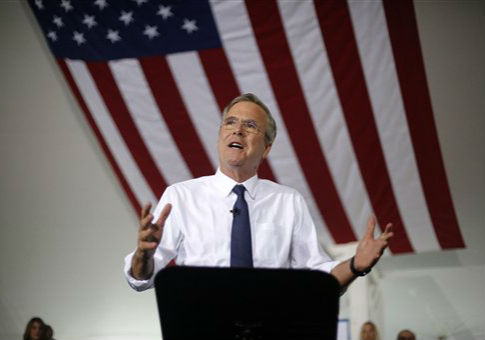Jeb Bush unveiled proposals on Tuesday that he said would preserve Medicare and Social Security for seniors while ensuring that funding remains for other priorities such as national defense.
The Republican presidential candidate and former governor of Florida said in a post on Medium that, according to the Congressional Budget Office, healthcare programs and Social Security now account for almost half of the federal budget, compared with just a sixth of government spending in 1965. Spending on those programs, as a share of the economy, will more than double by 2040.
The growth of entitlements will ultimately result in benefit cuts for seniors, Bush said, as well as fewer resources for equipping and training the military. Defense spending is on track to shrink to less than 3 percent of GDP by 2019, the lowest level in decades, according to a recent report from the American Enterprise Institute.
"If we do not have an honest conversation about what it will take to protect Medicare and Social Security, we fail seniors and we will fail the next generation of Americans," said Bush, the former governor of Florida.
The Bush campaign shared additional details about his plans with the Washington Free Beacon.
For Medicare, Bush said a bipartisan premium support model would lower costs for seniors by about 6 percent on average. Patients would be able to choose from private plans or traditional Medicare, and the government would provide payments based on the average of those plans’ prices.
"Paul Ryan and other courageous conservatives have championed this approach to improve the structure of Medicare," he said. "If we act now, we can leave the next generation of Americans with a more prosperous future."
He said he would also reduce Medicare subsidies for wealthier seniors, eliminate waste, and allow patients to keep their tax-free health savings accounts under Medicare, which they are currently not permitted to do.
To encourage private saving and reduce dependence on government benefits, Bush said he would develop "starter 401(k) plans" for small business workers, even if their employers cannot afford to make matching contributions. Small businesses would also be able to cut costs by accessing a single retirement savings plan for their workers.
Bush said "we need to recognize that Americans are living longer, healthier lives, and we should make it easier for those who choose to work longer." He said he would help those seniors who work longer by giving them larger checks once they claim Social Security benefits and eliminating the payroll tax for workers at age 67.
Additionally, Bush said he would take several steps to ensure that Social Security remains solvent. His proposals include gradually raising the retirement age beginning in 2022, providing a higher minimum benefit to low-income seniors who have worked for at least 30 years, reducing checks for wealthier workers, and using a different inflation measure known as the "chained consumer price index."
"These kinds of reforms will ensure that Social Security remains stable over the next 75 years," he said. Without changes, benefits will be cut by more than 20 percent in 2034, according to government figures.
Bush has previously released his proposals for improving cyber security and boosting energy production.
Bush is currently running fourth in the GOP primary race, according to the Real Clear Politics poll average. The candidates will participate in their third debate at 8 p.m. on Wednesday at the University of Colorado in Boulder.
